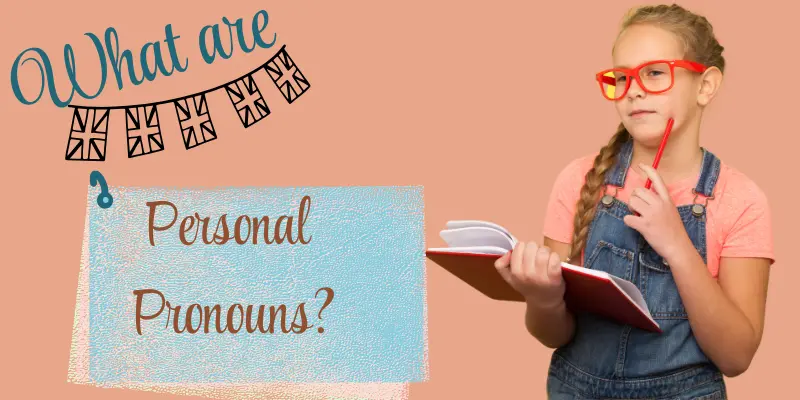What is a Personal Pronoun? Everything You Need to Know
Published: 10 Nov 2024
Personal pronouns might sound tricky at first, but once you understand them, they make speaking and writing so much easier! These little words help us avoid repeating names and make our sentences sound smoother.
Whether you’re talking about yourself, someone else, or a group of people, personal pronouns are there to help you express yourself clearly.
By the end of this guide, you’ll feel confident using personal pronouns in all your sentences—no more confusion, just simple, effective communication!
Let’s get started and have some fun with it!
What are Personal Pronouns?

Personal pronouns are words that help us talk about people without always saying their names. Imagine you’re telling a story about your friend Sarah. Instead of saying “Sarah went to Sarah’s house,” you can say “She went to her house.” Isn’t that easier?
Personal pronouns are like shortcuts that make talking and writing smoother. They can refer to:
- First-person: when you’re talking about yourself, like “I” or “we.”
- Second person: when you’re talking to someone else, like “you.”
- Third person: when you’re talking about someone else, like “he,” “she,” “it,” or “they.”
By using personal pronouns, we make sentences shorter, faster, and more fun! It helps you speak clearly and not repeat the same name over and over.
Person, Number, Gender, and Case
When we talk about personal pronouns, there are four important things to understand: person, number, gender, and case. These four factors help us use pronouns correctly to make our sentences clear and easy to understand. Let’s break it down:
- Person refers to who we’re talking about. Is it the speaker, the listener, or someone else?
- Number tells us whether we are talking about one person or more than one.
- Gender shows if the pronoun is for a male, female, or something neutral.
- Case determines how the pronoun is being used in the sentence, such as the subject, object, or possession.
Here’s a table to help explain how personal pronouns work based on these four factors:
| Category | Type | Pronouns | Examples |
| Person | First Person | I, we | I am going to the store. / We are friends. |
| Second Person | you | You are my best friend. | |
| Third Person | he, she, it, they | He is running. / They are happy. | |
| Number | Singular | I, he, she, it | She is studying. / It is raining. |
| Plural | we, they | We are going to the park. / They are playing. | |
| Gender | Masculine | he | He is tall. |
| Feminine | she | She is kind. | |
| Neuter | it | It is a book. | |
| Gender-neutral | they (used for one person) | They are my friend. | |
| Case | Subject | I, he, she, we, they | She is happy. / We are learning. |
| Object | me, him, her, us, them | He saw me. / I called them. | |
| Possessive | my, his, her, our, their | This is her pencil. / It’s their book. |
First-Person Pronouns
First-person pronouns refer to ourselves. They don’t change based on gender, but they do change based on number (singular or plural) and case (subject, object, possessive, reflexive).
The pronoun “I” is always capitalized in English, making it unique compared to other pronouns.
There is often debate about the appropriateness of using first-person pronouns in formal or academic writing.
First-Person Pronouns
| Subject | Object | Possessive | Reflexive |
| I | me | mine | myself |
| we | us | ours | ourselves |
Examples in Sentences:
| Pronoun | Sentence Example |
| I | I love playing video games. |
| me | Can you help me with my homework? |
| mine | This book is mine. |
| myself | I made this cake myself. |
| we | We should work together. |
| us | Our teacher praised us. |
| ours | The trophy is ours. |
| ourselves | We must take care of ourselves. |
Second-Person Pronouns
Second-person pronouns are used when we talk directly to someone else. They are simple because they don’t change based on gender, and only the reflexive form changes between singular and plural.
However, using “you” in formal writing can be too casual, so it’s usually avoided.
Second-Person Pronouns:
| Subject | Object | Possessive | Reflexive |
| you | you | yours | yourself |
| you | you | yours | yourselves |
Examples in Sentences
| Pronoun | Sentence Example |
| you (singular) | You need to practice more. |
| you (object) | I will support you. |
| yours | Is this pen yours? |
| yourself | Take care of yourself. |
| you (plural) | You all did a fantastic job! |
| yourselves | You must challenge yourselves daily. |
Third-Person Pronouns
Third-person pronouns are a bit trickier. They change based on gender (he, she, it) and number (one person or many). We also use “it” for objects and “they” as a gender-neutral option for people.
The use of “they” for one person is becoming more common, especially to show respect for non-binary people.
Third-Person Pronouns:
| Subject | Object | Possessive | Reflexive |
| he | him | his | himself |
| she | her | hers | herself |
| it | it | its | itself |
| they (singular) | them | theirs | themself |
| they (plural) | them | theirs | themselves |
Examples in Sentences:
| Pronoun | Sentence Example |
| he | He scored the winning goal. |
| him | We congratulated him. |
| his | That bike is his. |
| himself | He fixed the car himself. |
| she | She loves painting. |
| her | I borrowed this from her. |
| hers | The blue scarf is hers. |
| herself | She made dinner herself. |
| it | It looks amazing. |
| its | The dog wagged its tail. |
| itself | The cat washed itself. |
| they | They won the championship. |
| them | We cheered for them. |
| theirs | The victory was theirs. |
| themselves | They prepared themselves well. |
Impersonal Pronouns
Impersonal pronouns are used when we’re not referring to a specific person or thing. These pronouns help make statements or observations more general and often do not indicate a specific gender or number.
Common Impersonal Pronouns:
- It: Used to refer to the weather, time, or general situations.
- One: Used to make general statements about people.
Examples and Explanation:
- “It“:
- We use “it” to talk about things like weather, time, or conditions without specifying a person or thing.
- Example Sentences:
- It is raining outside.
- It is important to eat healthy food.
- It seems that everyone enjoyed the party.
- “One“:
- The pronoun “one” is used to speak about people in general, not pointing to anyone specific.
- Example Sentences:
- One should always tell the truth.
- One must be careful when driving at night.
- If one works hard, success will come.
Usage Tips:
- Impersonal pronouns make your speech or writing sound more formal or general.
- They are often used in advice or general observations.
Personal Pronoun Exercises
Test your knowledge of personal pronouns with these fun exercises! Choose the correct pronoun to complete each sentence. Ready to get started? Let’s go!
- ___ (He/We) are planning a surprise dinner party for us family.
- Maria and ___ (I/me) went shopping yesterday.
- Can ___ (they/them) come over to play this afternoon?
- This present is for ___ (you/your), not for anyone else.
- ___ (It/They) was a beautiful day at the beach.
- My brother loves soccer, and ___ (he/him) plays every weekend.
- ___ (She/Her) baked cookies for the entire class.
- If ___ (We/Us) collaborate, we can complete the project more efficiently.
- Please give the book to ___ (me/I) when you’re done.
- ___ (They/Their) are excited to meet you.
Answers
- We
- I
- they
- you
- It
- he
- She
- we
- me
- They
Conclusion
Personal pronouns may seem complicated at first, but they’re your language superheroes, making communication clear, smooth, and fun. Whether you’re talking about yourself (I am excited!), addressing someone directly (You did great!), or describing others (They are amazing friends!), personal pronouns simplify sentences and keep things interesting.
We’ve also learned about impersonal pronouns like one for talking about the weather or general situations, and one for giving advice. These pronouns help us share ideas more greatly.
So, don’t be afraid to use personal pronouns confidently. With a little practice, you’ll be a pro at making your writing and speaking shine! Keep learning, keep practicing, and enjoy the power of pronouns!
FAQs
1. Can you give personal pronoun examples?
Sure! Here are some personal pronoun examples:
- I am excited for the trip.
- We are planning a surprise party.
- You did a great job!
- I can help you with your homework.
- He is going to the game.
- She loves to sing.
- It is a beautiful day.
- They are my friends.
2. What is the difference between a pronoun and a personal pronoun?
A pronoun is a word that takes the place of a noun to avoid repetition, such as “it,” “they,” or “this.” A personal pronoun is a specific type of pronoun used to refer to people or things, depending on person, number, and gender. Examples include “I,” “you,” “he,” “she,” “we,” and “they.” While all personal pronouns are pronouns, not all pronouns are personal pronouns.
3. What are the types of personal pronouns?
Personal pronouns can be classified into five main types:
- Subject pronouns (e.g., I, you, he, she)
- Object pronouns (e.g., me, you, him, her)
- Possessive pronouns (e.g., mine, yours, his, hers)
- Reflexive pronouns (e.g., myself, yourself, himself, herself)
- Reciprocal pronouns (e.g., each other, one another)
- Possessive Adjectives (e.g., my, your, her, his, its, their, our)
4. Can “they” be used for one person?
Yes, “they” can be used for one person. It’s commonly used as a singular pronoun to refer to someone whose gender is unknown or to someone who prefers not to identify with a binary gender. This gender-neutral usage of “they” is widely accepted in both spoken and written English.
5. Why are personal pronouns important in writing and speaking?
Personal pronouns are essential because they simplify sentences, making communication clearer and more concise. Without them, we would have to repeat names and objects continuously, which would make sentences longer and harder to understand.

- Be Respectful
- Stay Relevant
- Stay Positive
- True Feedback
- Encourage Discussion
- Avoid Spamming
- No Fake News
- Don't Copy-Paste
- No Personal Attacks



- Be Respectful
- Stay Relevant
- Stay Positive
- True Feedback
- Encourage Discussion
- Avoid Spamming
- No Fake News
- Don't Copy-Paste
- No Personal Attacks





